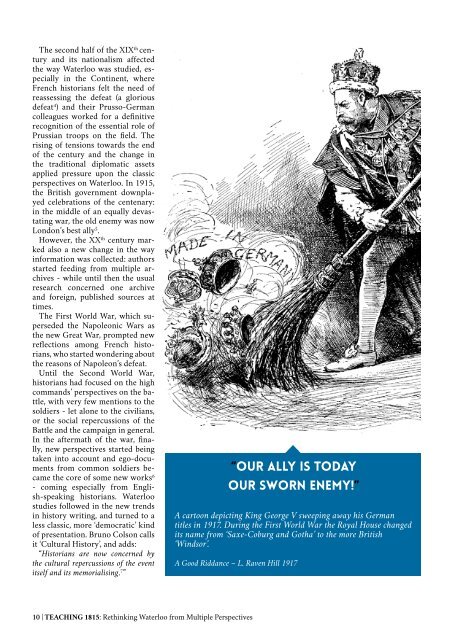Teaching 1815 - Rethinking Waterloo from multiple perspectives (Francesco Scatigna, EUROCLIO)
Teaching 1815 - Rethinking Waterloo from multiple perspectives (Francesco Scatigna, EUROCLIO)
Teaching 1815 - Rethinking Waterloo from multiple perspectives (Francesco Scatigna, EUROCLIO)
You also want an ePaper? Increase the reach of your titles
YUMPU automatically turns print PDFs into web optimized ePapers that Google loves.
The second half of the XIX th century<br />
and its nationalism affected<br />
the way <strong>Waterloo</strong> was studied, especially<br />
in the Continent, where<br />
French historians felt the need of<br />
reassessing the defeat (a glorious<br />
defeat 4 ) and their Prusso-German<br />
colleagues worked for a definitive<br />
recognition of the essential role of<br />
Prussian troops on the field. The<br />
rising of tensions towards the end<br />
of the century and the change in<br />
the traditional diplomatic assets<br />
applied pressure upon the classic<br />
<strong>perspectives</strong> on <strong>Waterloo</strong>. In 1915,<br />
the British government downplayed<br />
celebrations of the centenary:<br />
in the middle of an equally devastating<br />
war, the old enemy was now<br />
London’s best ally 5 .<br />
However, the XX th century marked<br />
also a new change in the way<br />
information was collected: authors<br />
started feeding <strong>from</strong> <strong>multiple</strong> archives<br />
- while until then the usual<br />
research concerned one archive<br />
and foreign, published sources at<br />
times.<br />
The First World War, which superseded<br />
the Napoleonic Wars as<br />
the new Great War, prompted new<br />
reflections among French historians,<br />
who started wondering about<br />
the reasons of Napoleon’s defeat.<br />
Until the Second World War,<br />
historians had focused on the high<br />
commands’ <strong>perspectives</strong> on the battle,<br />
with very few mentions to the<br />
soldiers - let alone to the civilians,<br />
or the social repercussions of the<br />
Battle and the campaign in general.<br />
In the aftermath of the war, finally,<br />
new <strong>perspectives</strong> started being<br />
taken into account and ego-documents<br />
<strong>from</strong> common soldiers became<br />
the core of some new works 6<br />
- coming especially <strong>from</strong> English-speaking<br />
historians. <strong>Waterloo</strong><br />
studies followed in the new trends<br />
in history writing, and turned to a<br />
less classic, more ‘democratic’ kind<br />
of presentation. Bruno Colson calls<br />
it ‘Cultural History’, and adds:<br />
“Historians are now concerned by<br />
the cultural repercussions of the event<br />
itself and its memorialising. 7 ”<br />
“Our ally is today<br />
our sworn enemy!”<br />
A cartoon depicting King George V sweeping away his German<br />
titles in 1917. During the First World War the Royal House changed<br />
its name <strong>from</strong> ‘Saxe-Coburg and Gotha’ to the more British<br />
‘Windsor’.<br />
A Good Riddance – L. Raven Hill 1917<br />
10 | TEACHING <strong>1815</strong>: <strong>Rethinking</strong> <strong>Waterloo</strong> <strong>from</strong> Multiple Perspectives


